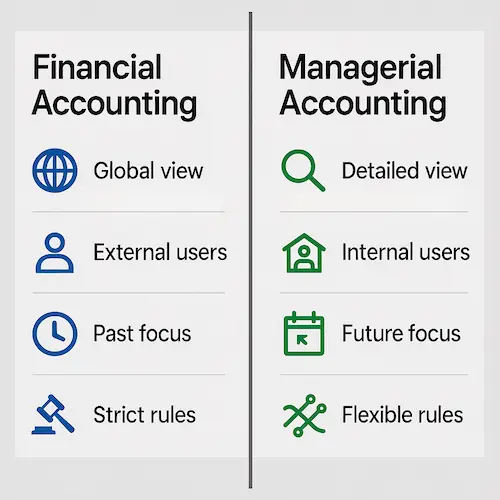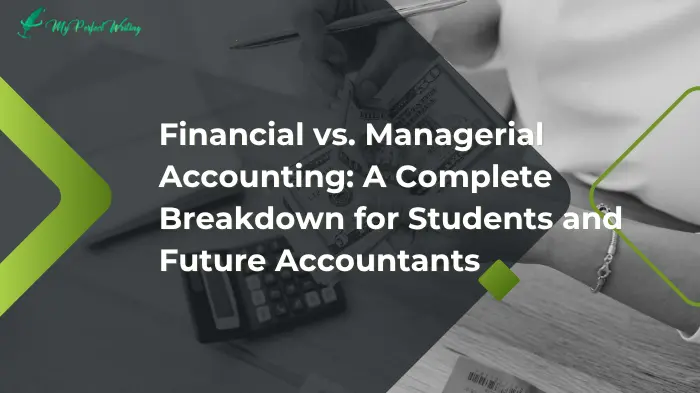1. The Core Objective: Reporting vs. Decision Making
To understand the difference, you must first look at the "Why." Why are we recording these numbers, and what is the end goal?
Financial Accounting: The Scorekeeper
Financial accounting is primarily concerned with the production of information for external use. It acts as the "history book" of the company. Its main goal is to provide an accurate, verifiable snapshot of the company's financial performance over a specific period, such as a quarter or a fiscal year.
This branch focuses on answering: “How well did the company perform in the past?”
The result is the creation of formal financial statements—the Balance Sheet, Income Statement, and Cash Flow Statement. These documents act as a scorecard that tells the outside world if the business is profitable, solvent, and stable.
Managerial Accounting: The Strategist
In contrast, managerial accounting (often called management accounting) is the "crystal ball" of the organization. Its goal is to help managers plan, control, and make decisions for the future. It is not about filing taxes; it is about strategy.
This branch answers the question: “How can we improve performance next month?”
Instead of looking backward, managerial accounting uses data to forecast future trends, calculate the cost of new products, and determine pricing strategies. It focuses on efficiency and problem-solving.
2. The Intended Audience: Outsiders vs. Insiders
When writing an academic paper, you must always consider your audience. The same rule applies to accounting reports.
External Stakeholders (Financial Accounting)
Financial accounting reports are prepared for people outside the organization. This includes investors, creditors, banks, tax authorities (like the HMRC or IRS), and shareholders. These parties need reliable data to decide whether to buy stock, lend money, or audit the company. Because these users cannot walk into the CEO's office to check the books, they rely heavily on these standardized reports.
Internal Stakeholders (Managerial Accounting)
Managerial accounting is exclusively for people inside the organization. This includes the CEO, department heads, production supervisors, and sales directors. These individuals need detailed, specific information to run the business day-to-day. For example, a production manager needs to know the specific cost of raw materials per unit, not just the total assets of the company.
3. Rules and Regulations: Rigid vs. Flexible
One of the most significant differences students encounter is the regulatory environment.
The Rigidity of Financial Accounting
Because financial accounting is used by the public and banks, it must be strictly regulated to prevent fraud. In the UK and internationally, companies generally follow IFRS (International Financial Reporting Standards), while the US uses GAAP (Generally Accepted Accounting Principles).
If a company deviates from these rules, it faces legal action and fines. There is no room for creativity; the format is mandatory.
The Flexibility of Managerial Accounting
Managerial accounting is the "Wild West" in comparison. No legal requirements dictate how internal reports should look. If a manager needs a report on "electricity usage per employee," the accounting team creates it. The only rule in managerial accounting is relevance: Does this data help us make a better decision? If the answer is yes, the report is useful, regardless of the format.
4. Time Horizon and Scope
- Historical vs. Futuristic: Financial accounting deals with history. It aggregates data from transactions that have already occurred. It is precise and factual. Managerial accounting is speculative. It involves budgeting, forecasting, and estimating. While it uses past data as a baseline, its focus is on predicting future outcomes.
- Company-Wide vs. Segmented: Financial accounting looks at the organization as a whole entity. Managerial accounting digs deeper, breaking down data by department, product line, or geographic location to find specific areas of profit or loss.

How My Perfect Writing Can Help You Excel in Accounting
Accounting is a cumulative subject; if you miss the basics of debits and credits, advanced topics like variance analysis or consolidation can feel impossible. At My Perfect Writing, we understand the pressure students face when juggling complex calculations and theoretical essays.
We have categorized our services to ensure you get the specific help you need. Here is how we incorporate the keywords relevant to your coursework:
1. Comprehensive Accounting Assignment Help
General accounting courses often cover a mix of financial and managerial topics. Whether you are analyzing a balance sheet or writing an essay on accounting ethics, My Perfect Writing's accounting assignment help service connects you with experts who understand the broad spectrum of the discipline. We ensure your papers meet academic standards and are plagiarism-free.
2. Specialized Finance Assignment Help
Moving beyond basic accounting, finance deals with the management of large sums of money and investments. If your module involves Corporate Finance, risk management, or capital budgeting, our finance assignment help is designed to assist you with complex calculations and financial modeling.
3. Cost Accounting Assignment Help
This is the backbone of managerial accounting. Students often struggle with topics like break-even analysis, overhead allocation, and marginal costing. My Perfect Writing cost accounting assignment help focuses on these internal calculation methods, helping you understand how businesses determine the price of their products and control expenses.
4. Bookkeeping Assignment Help
Every great accountant starts with the basics. If you are in the early stages of your degree, you might be tasked with recording daily transactions, posting to ledgers, and preparing a trial balance. Our bookkeeping assignment help ensures your foundational knowledge is solid, helping you record transactions accurately without errors.
5. Personal Finance Assignment Help
Not all accounting is corporate. Many courses now include modules on individual wealth management, taxation, and retirement planning. Our personal finance assignment help assists students in understanding how to manage personal assets, calculate income tax, and plan for long-term financial security.
Conclusion
While Financial Accounting acts as the official scorecard for external stakeholders by recording historical performance, Managerial Accounting serves as the strategic engine for internal decision-makers to plan for the future. Both disciplines are vital for a robust business ecosystem, yet mastering their distinct rules, audiences, and objectives can be challenging for students juggling multiple deadlines.
Understanding these differences is crucial for your professional development, but you do not have to navigate the complexities of balance sheets and forecasts alone; simply reach out to our expert team and say, "do my accounting assignment," and let us help you secure the grades you deserve.
Frequently Asked Questions
Which is harder: Financial or Managerial Accounting?
It depends on your mindset. Financial accounting requires rote memorization of rules (GAAP/IFRS) and strict compliance. Managerial accounting requires critical thinking, logic, and the ability to interpret data for strategy. If you prefer rules, Financial might be easier. If you prefer problem-solving, Managerial might be your strength.
Can I use Financial Accounting data for Managerial purposes?
Yes, absolutely. Managerial accounting often starts with the financial data collected by the company (like sales figures and expenses), but then analyzes it differently—breaking it down by department or using it to predict future trends.
Do I need strong math skills for these assignments?
You need to be comfortable with numbers, but you don't need advanced calculus. Arithmetic, algebra, and a good understanding of Excel are usually sufficient. However, if you are struggling with the calculations in your coursework, our finance assignment help can guide you through the process.
What are the career paths for these fields?
Financial accounting leads to roles like auditor, tax consultant, or financial controller, often requiring a CPA. In contrast, managerial accounting supports careers such as cost accountant, budget analyst, or CFO, with qualifications like CMA or CIMA preferred.
How do I get help with a specific accounting topic?
Simply visit My Perfect Writing. Depending on your specific need—whether it is cost accounting assignment help for internal reporting or bookkeeping assignment help for basic ledgers—we have a specialized expert ready to assist you.
Meet Our Professional Essay Writers
Empowering Your Academic Writing Journey with Authority, Expertise, and Experience
Dr. Emma Wilson
PhD in Literature
Prof. James Chen
MSc in Computer Science
Dr. Sarah Ahmed
PhD in Law & Ethics
Ready to Work With Our Expert Writers?







